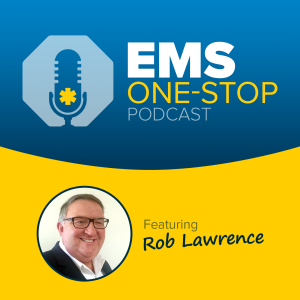
Monday May 13, 2024
A billion dollars of savings: The legacy of ET3
Editor’s note: This episode of EMS One-Stop With Rob Lawrence is brought to you by Lexipol, the experts in policy, training, wellness support and grants assistance for first responders and government leaders. To learn more, visit lexipol.com.
In this episode of the EMS One-Stop podcast, host Rob Lawrence welcomes back Matt Zavadsky to discuss the latest development in the move to fund treatment in place and the recent disclosure from CMS about the potential savings to Medicare identified in the analysis of the limited ET3 program.
Matt discusses the potential legislative moves regarding EMS funding, highlighting bipartisan support and urging listeners to engage with elected officials to support bills benefiting EMS.
The conversation underscores the need for sustained advocacy efforts and highlights the level of interest shown by key policymakers.
Rob and Matt also discuss the recent developments in the City of Fort Worth and the decision to absorb MedStar into the Fort Worth Fire Department, emphasizing the need to ensure equitable treatment for EMS personnel transitioning to new roles.
Top quotes from this episode
“We can officially say that the net savings to Medicare after they pay EMS and after they pay the tertiary provider telemedicine, whatever it is, is still $550 to $570 per enrolled ET3 participant. And when you do the math, that's a billion dollars or more of savings to the Medicare program, which now CBO can use to evaluate the benefit, economically of doing a treat, no transport, treatment-in-place model. So it's big news.” — Matt Zavadsky
“Nobody benefits from a knock-down, drag-out fight. But as you indicated, there are now people in the community and people across the country that are saying why and what does this mean? We don't have all those answers, but again, it's the decision from the folks who are elected to represent the community and if that's what they want to do, that's great. Our role is to try and do as much as we can to maintain a transition into a new provider system that keeps those core tenants – the high performance, high value mobile, integrated healthcare, flexible deployment. All those things that have really made the system a world class EMS system, even though it might say something different on the side of the ambulance and the employees might be wearing a different uniform.” — Matt Zavadsky
“It's going to be a long transition – 12 to 18 months, and it's not just branding and rebranding, it's really infusing the culture of a group of people who are used to doing 7-10 calls in 12 hours and used to having things operate with a certain cadence that's going to be totally different when they start a different type of organization.” — Matt Zavadsky
Episode contents
00:00 – Introduction
02:15 – ET3/TIP: Challenging CMS outcome data
03:15 – Cost savings per intervention
04:00 – CMS data showing net savings to Medicare
04:30 – Congressional Budget Office score based on savings
06:00 – Net savings of a billion dollars or more
07:00 – Applying this new information for the good and benefit of the industry
09:00 – Congress is, is what Congress does
10:40 – Meeting with Congress to push TIP
14:30 – Fort Worth and the PWW Advisory Group
14:50 – Fort Worth economies and level of service
17:30 – Matt Zavadsky to join the PWW Advisory Group
19:15 – The staffing issues as Med star staff transit to the FD fire department
21:00 – Ensuring the staff is protected
25:00 – Call to action-how we communicate all value to elected officials
26:00 – Final Thoughts
About our guest
Matt Zavadsky is the former chief transformation Officer at MedStar Mobile Healthcare, formerly the exclusive emergency and non-emergency public utility model EMS system for Fort Worth and 14 other cities in North Texas.
Coming to MedStar in 2008 as the operations director, Matt made significant changes to the EMS delivery model, and in 2010, successfully eliminated the need for the tax subsidy that MedStar had been operating on since its inception in 1986. He has helped guide the development and implementation of numerous innovative programs with healthcare partners that have transformed MedStar fully as a Mobile Integrated Healthcare (MIH) provider, including high utilizer, CHF readmission reduction, observational admission reduction, hospice revocation avoidance, 911 nurse triage programs and partnerships with home health agencies. He is also the co-author of the book “Mobile Integrated Healthcare – Approach to Implementation,” published by Jones and Bartlett Publishing.
He has 42 years’ experience in EMS and holds a master’s degree in Health Service Administration with a graduate certificate in Healthcare Data Management. Matt is a frequent speaker at national conferences and has consulted on numerous EMS issues, specializing in high-performance EMS operations, finance, mobile integrated healthcare, public/media relations, public policy, transformative economic strategies and EMS research.
No comments yet. Be the first to say something!